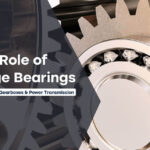In power plants, bearings are essential parts that often go unnoticed. They are key to ensuring pumps and blowers work smoothly and keep the movement of fluids and air running well in the plant. Bearings for industrial pumps and blowers ensure water, feedwater, and combustion air systems work efficiently and without problems. Ensure your bearings are maintained and selected well to improve a plant’s energy efficiency and uptime.
In this blog, we will look at why bearings matter for pumps and blowers, how to save energy, and the benefits of keeping up with preventive maintenance to lessen downtime.
Key Pump and Blower Applications That Use Bearings
Power plants depend on pumps and blowers to keep important processes going. Proper operation of these systems relies on bearings. Among the main uses are:
1. Pumps: They ensure feedwater, cooling water, and condensate move through the plant. Pump bearings in power plants assist these pumps in coping with high pressures and temperatures so that fluids are moved without problems.
2. Blowers: Blowers in factories supply air that is important for burning fuel and keeping things cool. Blower bearings for industrial use are built to deal with the high rotational and axial loads that blowers experience in fast-moving applications.
The life and performance of these systems depend on selecting the correct bearing. For example, ball bearings for water pumps are favored because they can support high loads and efficiently reduce friction, so water pumps waste less energy.
Use Case: Bearings in Condensate and Feedwater Pump Systems
In power plants, condensate and feedwater pumps are two central systems. They are both needed to keep the steam cycle working and ensure that power plants run well.
1. Feedwater Pump Bearings: The pumps provide water to the boilers, where the water turns into steam. Feedwater pump bearings are required to function well under high pressure, heat, and long hours of running. Using the best bearings means the pumps work well and help prevent the kind of breakdowns that can cause costly power plant shutdowns.
2. Condensate Pump Bearing Solutions: Condensed steam must be returned to the system. Managing corrosion from minerals and chemicals in the water is essential for condensate pump-bearing solutions. Appropriate bearing selection means the condensate pumps handle these stresses well and work dependably.
The smooth operation of both feedwater pumps and condensate pumps depends on these bearing solutions, which are key for power plant reliability and efficiency.
Reducing Energy Loss with Efficient Bearing Selection
High energy efficiency is vital for running a power plant. They use bearings to lower the amount of energy lost. The right bearings help lower friction and stop power from being wasted. That means the equipment operates more smoothly and efficiently.
For example, split roller bearings in blowers aim to lower friction and carry heavy loads. Such bearings let the blowers operate while needing less energy. Installation of split roller bearings in blowers keeps energy use low, even as the blowers continue to run well.
Efficient bearing selection also helps prevent excessive wear on other machine parts. Good bearings lower the mechanical load, allowing pumps and blowers to work longer without needing big repairs or replacement.
How to Minimize Downtime Through Preventive Maintenance?
Unplanned shutdowns are one of the most complex problems for power plants. When failures happen without warning, they can force the plant to stop, resulting in cost overruns. However, preventive maintenance for bearings can help minimize the risk of these breakdowns.
By keeping up with lubrication and inspection, bearings will keep running efficiently. For example:
1. Lubrication: Efficient lubrication lowers friction, stops bearings from getting too hot, and keeps things running well.
2. Inspection: Routine inspections help find wear early, so fixing issues before major breakdowns happen is possible.
3. Replacement: When bearings begin to wear out, replacing them immediately stops extra wear on the machinery.
By implementing a robust preventive maintenance plan, power plants can minimize pump downtime and ensure that essential systems like feedwater and blower bearings for industrial use operate continuously with minimal interruptions.
Split Roller Bearings in Large Industrial Blowers
Split roller bearings are essential to industrial blowers that see frequent high speeds and heavy loads. Their design allows them to manage the challenging operating conditions of industrial blowers in power plants.
Below are the main benefits of split roller bearings in blowers:
1. Ease of Maintenance: Because these bearings can be split, replacing them is fast and saves both time and money on maintenance.
2. Increased Durability: The blower system is more reliable because split roller bearings are made to endure heavy loads.
3. Better Efficiency: Because these bearings lower friction, the blower spends less energy and operates efficiently.
When a lot of air must be constantly moved, split roller bearings help keep blowers working well and prevent mechanical problems.
Ball Bearings in Circulating Water Pumps
Ball bearings are what most power plants use for water pump bearings in their water circulation systems. These bearings decrease the friction in pumps that circulate a lot of water, mainly used to cool or control thermal systems in power generation.
Several reasons make ball bearings useful for water pumps:
1. Reduced Friction: Because ball bearings lower friction, the pump can move water more efficiently and smoothly.
2. Longer Lifespan: Because wear and tear are minimized, ball bearings make water pumps last longer.
3. Energy Efficiency: These bearings reduce friction, allowing power plants to use less energy, which is very important for big operations.
Using the correct ball bearings for water pumps helps power plants improve how well they cool and control their energy expenses.
Conclusion
In short, bearings help keep pumps and blowers in power plants running without problems. The proper choice of bearings for both power plant pumps and industrial blowers guarantees that these key components work reliably. Power facilities that pay attention to bearing selection and preventive care for bearings can save energy, prevent equipment trouble, and increase equipment lifespan.
Special type bearings, like split roller ones in blowers and ball bearings for pumps, offer greater strength, better efficiency, and higher reliability. These attributes make power plants operate efficiently and with lower costs. If power plants use the best bearings and maintain good maintenance, they can run better and have lower maintenance costs.


